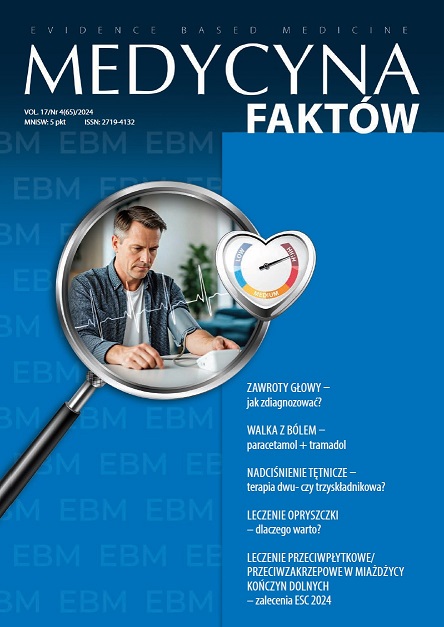Zasadnosc suplementacji urydyna w kontekscie starzenia sie układu nerwowego Artykuł przeglądowy
##plugins.themes.bootstrap3.article.main##
Abstrakt
Artykuł omawia zasadność suplementacji urydyną w kontekście chorób neurologicznych, koncentrując się na jej wpływie na funkcjonowanie układu nerwowego. Urydyna jako kluczowy nukleozyd pirymidynowy odgrywa istotną rolę w syntezie fosfolipidów, odbudowie błon neuronalnych, produkcji neuroprzekaźników oraz procesach neuroprotekcyjnych. Badania wskazują, że jej suplementacja (zwłaszcza w połączeniu z witaminami z grupy B) może wspierać regenerację synaps i poprawiać przewodnictwo nerwowe.
Artykuł szczegółowo analizuje kliniczne dowody skuteczności suplementacji urydyną, zwłaszcza w kontekście przeciwdziałania procesom prowadzącym do starzenia się układu nerwowego. W badaniach nad niedokrwiennym uszkodzeniem mózgu wykazano, że jej stosowanie może poprawiać pamięć oraz ograniczać atrofię. W neuropatiach obwodowych udokumentowano jej korzystny wpływ na redukcję bólu neuropatycznego oraz wspieranie regeneracji nerwów. Podsumowując: suplementacja urydyną stanowi obiecującą strategię terapeutyczną w neuroprotekcji oraz wspomaganiu funkcji poznawczych i regeneracji układu nerwowego.
##plugins.themes.bootstrap3.article.details##
Copyright © by Medical Education. All rights reserved.
Bibliografia
2. Blinkouskaya Y, Caçoilo A, Gollamudi T et al. Brain aging mechanisms with mechanical manifestations. Mech Ageing Dev. 2021; 200: 111575.
3. Petersen RC, Roberts RO, Knopman DS et al. Prevalence of mild cognitive impairment is higher in men. The Mayo Clinic Study of Aging. Neurology. 2010; 75(10): 889-97. http://doi.org/10.1212/WNL.0b013e3181f11d85.
4. Erkinjuntti T, Gauthier S. The concept of vascular cognitive impairment. Front Neurol Neurosci. 2009; 24: 79-85. http://doi.org/10.1159/000197886.
5. Agüero-Torres H, Fratiglioni L, Guo Z et al. Prognostic factors in very old demented adults: a seven-year follow-up from a population-based survey in Stockholm. J Am Geriatr Soc. 1998; 46(4): 444-52. http://doi.org/10.1111/j.1532-5415.1998.tb02464.x.
6. Samson WN, van Duijn CM, Hop WC et al. Clinical features and mortality in patients with early-onset Alzheimer’s disease. Eur Neurol. 1996; 36(2): 103-6. http://doi.org/10.1159/000117218.
7. Piechal A, Członkowska A. Otępienie naczyniopochodne. In: Stępień A. (ed.). Neurologia. Tom 2. Medical Tribune Polska, Warszawa 2020.
8. Wurtman RJ, Cansev M, Ulus IH. Synapse formation is enhanced by oral administration of uridine and DHA, the circulating precursors of brain phosphatides. J Nutr Health Aging. 2009; 13(3): 189-97.
9. Engelborghs S, Gilles C, Ivanoiu A et al. Rationale and clinical data supporting nutritional intervention in Alzheimer’s disease. Acta Clin Belg. 2014; 69(1): 17-24. http://doi.org/10.1179/0001551213Z.0000000006.
10. Goren B, Cakir A, Sevinc C et al. Uridine treatment protects against neonatal brain damage and long-term cognitive deficits caused by hyperoxia. Brain Res. 2017; 1676: 57-68. http://doi.org/10.1016/j.brainres.2017.09.010.
11. Al N, Çakir A, Koç C et al. Antioxidative effects of uridine in a neonatal rat model of hyperoxic brain injury. Turk J Med Sci. 2020; 50(8): 2059-66. http://doi.org/10.3906/sag-2002-14.
12. Goren B, Cakir A, Ocalan B et al. Long-term cognitive effects of uridine treatment in a neonatal rat model of hypoxic-ischemic encephalopathy. Brain Res. 2017; 1659: 81-7. http://doi.org/10.1016/ j.brainres.2017.01.026.
13. Scheltens P, Kamphuis PJ, Verhey FR et al. Efficacy of a medical food in mild Alzheimer’s disease: A randomized, controlled trial. Alzheimers Dement. 2010; 6(1): 1-10.e1. http://doi.org/10.1016/ j.jalz.2009.10.003.
14. Scheltens P, Twisk JW, Blesa R et al. Efficacy of Souvenaid in mild Alzheimer’s disease: results from a randomized, controlled trial. J Alzheimers Dis. 2012; 31(1): 225-36. http://doi.org/10.3233/JAD-2012-121189.
15. van Wijk N, Broersen LM, de Wilde MC et al. Targeting synaptic dysfunction in Alzheimer’s disease by administering a specific nutrient combination. J Alzheimers Dis. 2014; 38(3): 459-79. http://doi.org/10.3233/JAD-130998.
16. Chimakurthy AK, Lingam S, Pasya SKR et al. A Systematic Review of Dietary Supplements in Alzheimer’s Disease. Cureus. 2023; 15(1): e33982. http://doi.org/10.7759/cureus.33982.
17. Cummings J, Scheltens P, McKeith I et al. Effect Size Analyses of Souvenaid in Patients with Alzheimer’s Disease. J Alzheimers Dis. 2017; 55(3): 1131-9. http://doi.org/10.3233/JAD-160745.
18. Cummings J, Passmore P, McGuinness B et al. Souvenaid in the management of mild cognitive impairment: an expert consensus opinion. Alzheimers Res Ther. 2019; 11(1): 73. http://doi.org/10.1186/ s13195-019-0528-6.
19. Rasmussen J. The LipiDiDiet trial: what does it add to the current evidence for Fortasyn Connect in early Alzheimer’s disease? Clin Interv Aging. 2019; 14: 1481-92. http://doi.org/10.2147/CIA.S211739.
20. Goldberg H, Mibielli MA, Nunes CP et al. A double-blind, randomized, comparative study of the use of a combination of uridine triphosphate trisodium, cytidine monophosphate disodium, and hydroxocobalamin, versus isolated treatment with hydroxocobalamin, in patients presenting with compressive neuralgias. J Pain Res. 2017; 10: 397-404. http://doi.org/10.2147/JPR.S123045.
21. Negrão L, Almeida P, Alcino S et al. Effect of the combination of uridine nucleotides, folic acid and vitamin B12 on the clinical expression of peripheral neuropathies. Pain Manag. 2014; 4(3): 191-6. http://doi.org/10.2217/pmt.14.10.
22. Negrão L, Nunes P; Portuguese Group for the Study of Peripheral Neuropathy. Uridine monophosphate, folic acid and vitamin B12 in patients with symptomatic peripheral entrapment neuropathies. Pain Manag. 2016; 6(1): 25-9. http://doi.org/10.2217/pmt.15.60.
23. Monfort J, Carrión-Barberà I, Tío L et al. Evaluation of the Efficacy of the Addition of a Combination of Pyrimidine Nucleotides and Vitamin B1 and B12 to Standard Treatment in the Management of Painful Radiculopathy and in the Quality of Life of Patients. Nutrients. 2024; 16(23): 4187. http://doi.org/10.3390/nu16234187.
24. Mibielli MAN, Nunes CP, Goldberg H et al. Nucleotides Cytidine and Uridine Associated with Vitamin B12 vs B-Complex Vitamins in the Treatment of Low Back Pain: The NUBES Study. J Pain Res. 2020; 13: 2531-41. http://doi.org/10.2147/JPR.S277024.
